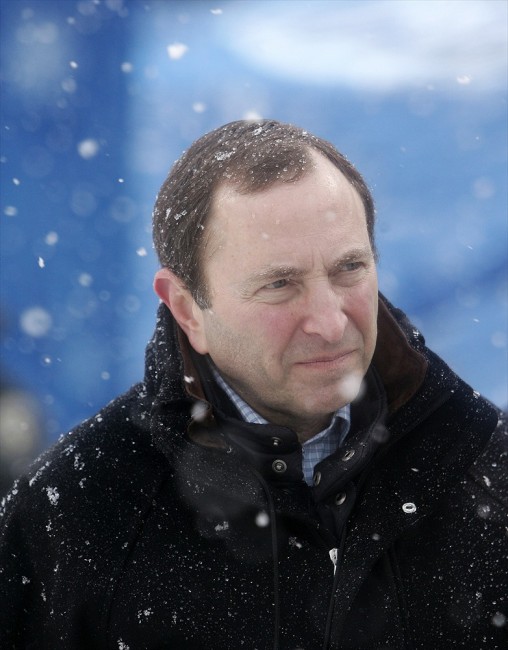
Tuesday, the NHL and NHLPA met to discuss the collective bargaining agreement. While there was hope that the two sides would make some progress it appears as if the two sides have once again met an impasse, which effectively has shut down all talks between the two sides.
Last week the NHL put forth a proposal to the NHLPA which called for a 50-50 split of all hockey related revenue. The NHLPA countered with three separate proposals of their own, with at least one proposal including a 50-50 split.
On the surface, with both sides willing to move towards a 50-50 split an agreement between both sides would seem very likely, but with the NHL and NHLPA unable to come to an agreement on what constitutes HRR and what term to get to the 50-50 split both sides endorsed last week we are once again at an impasse.
NHL Deputy Commissioner Bill Daly lamented that the NHLPA told the NHL that “have no intention of making a new proposal”, which means perhaps Donald Fehr and Company are calling Gary Bettman’s bluff when it was suggested last week that the NHL had made it’s best offer to the players.
With the talks seemingly going nowhere the 2012 NHL season continues to be in doubt, and unless the two sides can find some common ground the feeling is the negotiations may fall off the map and into an abyss of no communication.
With both the players and owners expected to incur huge losses if an agreement is not made it is hard to believe the two sides will refuse to meet. With negotiations becoming a virtual game of poker and with the two sides unwilling to back down from their hands, it appears as if both the NHL and NHLPA are willing to take their chances and let the chips fall where they may.
Bettman’s latest proposal included a drop dead date of October 25th. If a deal could be signed by that date the feeling was that NHL teams would have to play one extra game every five weeks in order to play a full 82-game season, which was another contingency of the NHL’s proposal.
Now, with the NHL already canceling more games and the two sides at yet another impasse, one wonders if the NHL will come forward with another counter offer or simply sit tight as Bettman suggested they would.
Outside of how to get to that 50-50 split the players are also concerned about their current contracts. The players want their current deals paid out in entirety, while the NHL would like to impose a level of rollback, which is what happened seven years ago when the last CBA was signed.
While it is easy for the fans to encourage the players to “do the deal” it is hard to imagine any of us agreeing to any sort of salary cuts without a fight.
Imagine signing a contract (which you thought was negotiated in good faith) with your employer a mere two months ago only to be slapped in the face with a pay-cut— how infuriated would you be right about now?
While the NHLPA would be hard-pressed to prove that the owners had prior knowledge to the proposed rollbacks, from a players point of view something doesn’t smell right!
It is becoming very clear that the players are looking to minimize any losses they may incur, taking both their own current contracts and the future contracts into account. The players are asking that the NHL owners “make whole” their current contracts— and how can you blame them?
If the owners could agree to “make whole” a deal would almost surely be made, but alas here we sit waiting for the billionaire owners and millionaire players to give us Fans our game back.
By allowing the NHL to enforce rollbacks in back-to-back CBA negotiations the players would be perpetuating a dangerous precedence which, going forward, could hurt future generations of hockey players.
What if the players agree to another roll back only to have the NHL ask again once this next CBA has expired? When do the rollbacks stop? And, if the players start anticipating this move, will they not start asking for even more money to off-set any future roll back?
From the owners side there is widespread belief that as many as 20 NHL franchises are failing to make a profit. If this is the case why should the owners be forced into a salary cap situation that continually leaves them in the red?
The fans will argue that it is the owners fault for continuing the nasty trend of signing players to big money/long term contracts that, in the minds of many, only served to circumvent the CBA.
While this may be true in some cases, the majority of the players’ contracts are not ten-year/$100 million deals, rather 2-5 year deals at “reasonable” dollar amounts— at least in comparison to $10 million a season!
Round and round we go, when the lockout ends, nobody knows.
At this point, with the season in real danger of being lost or downsized, it is tough to side with either the NHL or NHLPA. Hopefully cooler heads prevail.